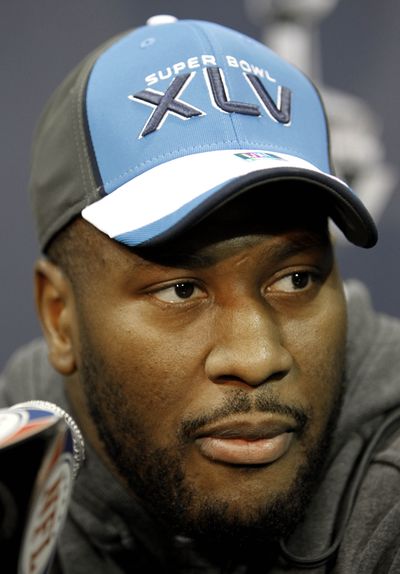Steelers’ Harrison defends hard hits with twisted logic

FORT WORTH, Texas – James Harrison needs protection.
From himself.
It sounds strange to say that about one of the most feared, and by far the most-fined player in the NFL this season, someone who calls himself the “poster guy” for the league’s campaign to stop the kind of vicious hits that harm others. Yet Harrison seems unconcerned with the possible damage he’s doing to himself in the short and long term. Either way, he’s convinced himself it’s well worth it.
“I’m willing to go through hell in gasoline drawers,” Pittsburgh’s All-Pro linebacker said Wednesday, “so that my kids don’t have to.”
Harrison may someday get the chance.
Several hours before the Steelers returned to the practice field at TCU to prepare for Sunday’s Super Bowl, Harrison was well-rested and injury-free. Yet mounting scientific evidence suggests that even high school and college football players are involved in more than enough collisions to risk lingering damage to both body and brain.
But when someone asked Harrison whether he worried about the toll all that hitting would take by the time he turned 50, this was his answer:
“My (linebackers) coach, Keith Butler, who played 10 years in the league, he’s close to around there and he’s doing fine. He’s coaching us very, very well. Nothing’s wrong with his head and he played when you could do a lot worse than what we’re doing right now.
“So I’m hoping,” he added, “I’m as blessed and as fortunate as him, to be in the same position that he is now – minus a couple hips and shoulders that he got replaced.”
Funny line.
But watching a former player wobble around with all his wits is not research, just like hoping is not a retirement plan.
Worse still, Harrison not only derided the league’s efforts to stop headhunting as just another moneymaking scheme; he’s used his podium for two straight days to taunt Commissioner Roger Goodell for trying.
“I don’t want to hurt nobody. I don’t want to step on nobody’s foot or hurt their toe. I don’t want to have no dirt or none of this rubber on this field fly into their eye and make their eye hurt,” he said during Tuesday’s media day. “I just want to tackle them softly on the ground and, if y’all can, we’ll lay a pillow down where I’m going to tackle them, so they don’t hit the ground too hard, Mr. Goodell.”
Given a chance to retract those comments Wednesday, Harrison proceeded full-speed ahead.
“If you want to get (hard hitting) totally out of the game, put flags on us. We’ll tag off and pull flags off each other,” he said, “and we’ll see how popular the game is then, and how many people come to watch it.”
None of this should come as a surprise. Harrison is one of those guys who made it to the NFL by refusing to back down, who used evaluations by pro scouts that he was too small and too slow as kindling. Undrafted out of college, he was cut four times and exiled for a season to Germany and NFL Europe.
To remember that difficult climb to stardom, he carried around his equipment bag from the Rhine Fire until it fell apart. Now 32, he remains as defiant as ever.
Soon after Goodell levied the first of what became $100,000 in fines for what he deemed illegal hits by Harrison, the Steelers star threatened to retire rather than try to change his style. Harrison acknowledged that playing that way had resulted in several concussions of his own, but not even one that he bothered to report.
By his twisted logic, Harrison says he’s “all for player safety.” But in the next breath, he vowed to continue to do his best to hide future concussions from team officials.
“You shouldn’t be able to come back in the game,” he said. “But if they don’t know, they don’t have that decision to make. …
“It’s a choice. No one is forcing me to play this game. They didn’t put a gun to my head and say, ‘James, go out there and play.’ It’s what I want to do. It’s what I like to do. It’s what I love to do.”
Harrison, paused and scanned the crowd of reporters standing in front of him.
“Did they force you to come out and do this? Did they put a gun to your head?” he asked.
No, we assured him, then pointed out that sports writers don’t risk concussions doing their jobs.
“You could,” Harrison said with a menacing smile, “if you say the wrong thing.”